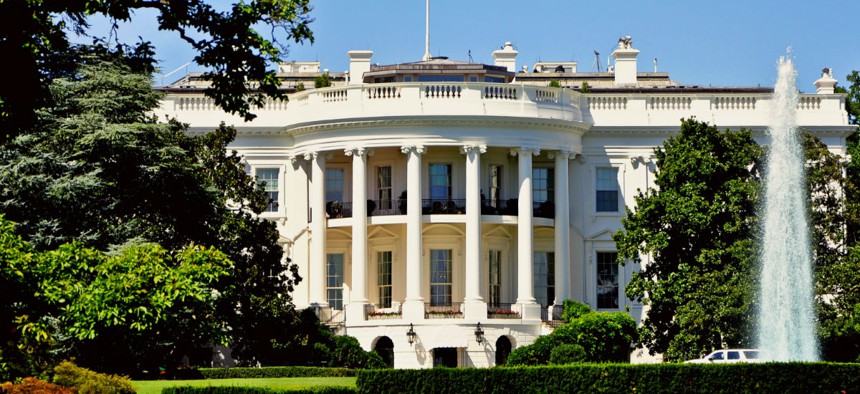Ethics Office Appears to Give White House a Break
Anonymous lobbyists could now donate to Trump aides’ future legal defense funds.
The Office of Government Ethics, currently led by Trump-appointed acting Director David Apol, has infuriated some ethics specialists with an unpublicized change in long-standing guidance that banned donations from lobbyists to White House staff for their legal defense funds. But OGE says the policy is unchanged.
As first reported by Politico, the office altered the agency’s internal view of Clinton-era guidance with a new, more permissive, introduction to the 1993 legal advisory that had been superseded. The White House offered a differing interpretation.
The Wednesday development came the same day OGE released a slightly critical updated review of White House ethics waivers, and as a nonprofit advocacy group sent the office a letter requesting a broadening of ethics rules.
Politico said: “The little-noticed change could help President Donald Trump’s aides raise the money they need to pay attorneys as the Russia probe expands — but raises the potential for hidden conflicts of interest or other ethics trouble.” The White House denied it had either sought a change or that aides were planning legal defense funds and expecting anonymous donations.
But Walter Shaub, who until July was director of OGE but left in frustration with Trump to join the Campaign Legal Center, tweeted several blasts at his former agency’s move. “This story disgusts me,” he wrote. “I was hoping it was a technical website glitch. But the acting director doesn't feel you deserve any answer, America.”
In a more formal statement, Shaub said, “OGE abandoned its 1993 opinion endorsing anonymous donations just months after issuing it. For the past 23 years, OGE has viewed anonymous donations as inappropriate. It’s not entirely clear why OGE quietly removed a warning that the opinion is invalid. In response to the negative media attention this unpublicized reversal generated, the White House was forced to concede last night that anonymous donations are inappropriate.”
The statement continued: “It’s a shame that OGE’s acting director took us down this road, and it’s an even greater shame that the White House is handling OGE’s media relations on this critical issue, given the importance of OGE remaining independent from the White House and serving as the ethics watchdog for the executive branch, not the White House Counsel’s lapdog.”
The White House dismissed Shaub's comments in a statement: "This is another example of Walter Shaub—who has no direct knowledge of anything the White House is doing or assisting with—trying to make himself feel relevant."
Also tweeting his dismay was Norm Eisen, the Obama White House ethics czar now at the Brookings Institution, who wrote, “Trump administration is inviting bribes in order to pay for staffers’ legal defense of other crimes.”
Under Shaub’s leadership, the 1993 guidance that permitted anonymous donations to defense funds had been later topped with this statement: “NOTE: SOME STATEMENTS IN THIS OPINION ARE NOT CONSISTENT WITH CURRENT OGE INTERPRETATION AND PRACTICE.”
Today, the legal advisory is topped in the same red type with this more permissive message: NOTE: THE PRIMARY FINDING ABOUT THE LIMITED APPLICABILITY OF 18 U.S.C. § 209 TO PAYMENTS MADE FOR AN EMPLOYEE'S LEGAL EXPENSES HAS NOT CHANGED. HOWEVER, BECAUSE EACH ANALYSIS IS VERY FACT-SPECIFIC, AGENCY ETHICS OFFICIALS SHOULD CONSULT WITH THEIR OGE DESK OFFICER BEFORE ADVISING EMPLOYEES ON THIS TOPIC.
The White House approach to issuing and disclosing ethics waivers for Trump appointees was one of the issues that made Shaub feel he could no longer effectively lead the ethics office. Wednesday’s report on executive branch waivers, compiled in response to an April 28 data call, found that “most agencies followed appropriate procedures when issuing waivers and authorizations, including ensuring that they were signed, dated and issued by an authorized official prior to the recipient engaging in the covered conduct. For the most part, agencies also appeared to have correctly applied (and articulated) any required legal standards and to have appropriately included necessary limitations on the recipient’s ability to act in the matters involved.”
However, the report stated, “the White House did not provide OGE or make available to the public signed or dated copies of 14 waivers and authorizations. Moreover, the original White House reply to OGE’s follow-up questions was entirely unresponsive. The White House did provide additional information in a supplemental response, but did not fully respond to OGE’s follow-up questions.”
On Thursday, an OGE spokeswoman told Government Executive that “OGE policy on anonymous contributions has not changed. The note posted on the 1993 opinion was changed only to clarify that the main part of the advisory was still valid, and to expressly encourage people to contact OGE before establishing a legal defense,” she added. “OGE continues to recommend that funds include language prohibiting anonymous contributions.”
Meanwhile, the nonprofit Project on Government Oversight sent OGE a letter requesting that it require more comprehensive ethics agreements and precisely inform agencies on requirements.
“Ethics agreements only cite the one-year recusal period established in regulation,” it said. “Since the beginning of the Obama administration and continuing today, the ethics pledge is only incorporated by reference into each appointee’s ethics agreement, which means there is no express citation of any two-year recusal periods….As a result of this omission, the appointee lacks a clear written record of all ethics requirements.”
This story was updated with a comment from the White House.




